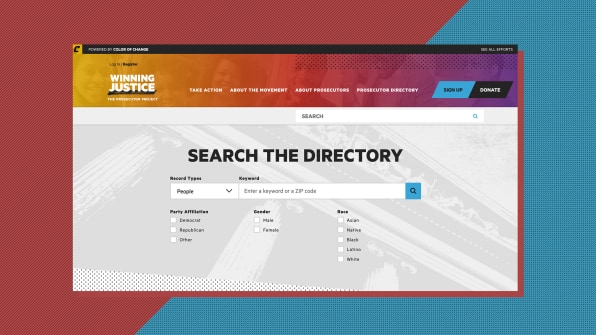You can’t curb police brutality or reform the criminal justice system in the U.S. without addressing the role of prosecutors. Prosecutors represent local, state, or federal governments in court, help investigate crimes, and ultimately decide what charges—if any—to bring against someone. And when there is police violence, it’s the prosecutor who decides whether they should be charged, as well (most of the time, they decide not to). Most prosecutors are elected, so a key way to effect real change by voting at the local level is to learn about your prosecutor and their record. This directory from Color of Change will help you do just that.
“People are asking what they can do. They’re seeing what’s happening on TV, they’re outraged by it, they’re upset,” says Rashad Robinson, president of Color of Change, a civil rights organization that creates campaigns to allow people to take action against racial injustice. “Yes, you want to get justice for George Floyd, Breonna Taylor, Ahmaud Arbery, and everyone else. But the thing I want to say to people is that you more than likely live in a place where you have an elected prosecutor who does not hold police accountable and who is running up mass incarceration.”
The U.S. accounts for under 5% of the world’s population, yet has nearly 25% of the world’s prison population. But police officers don’t see that same level of prosecution. About 1,000 times a year, a police officer shoots and kills someone while on duty, according to Philip Stinson, a professor of criminal justice at Bowling Green State University in Ohio and head of that school’s Police Integrity Research Group. Between 2005 and 2017, though, only 82 police officers across the country were charged with murder or manslaughter for an on-duty shooting. In that same time period, only 19 officers were convicted, and mostly for lesser manslaughter charges.

“Because people haven’t been paying attention to prosecutors, prosecutors have been operating under the radar,” Robinson says. “Over 70% of prosecutors right now run unopposed for election. These are folks that don’t even feel pressure from the public. They feel pressure from police unions, but not the public. So part of our effort is to ensure that prosecutors know there is a public out there that wants their communities to be safe, they want their communities to be full of justice. But safety and justice mean that we are working to ensure that our justice isn’t simply locking up and punishing people for things they shouldn’t be locked up and punished for, while letting police off for every infraction.”
The Prosecutor Directory is part of the Winning Justice platform, which was created to educate communities and activists about the state of criminal justice reform, their prosecutors’ stances on policy issues—from money bail to charging juveniles as adults— as well as their districts’ next election and demographics.
To find out about your local prosecutor, you can go to winningjustice.org and search by zip code to see where they stand on six of Color of Change’s demands for reducing mass incarceration. If you search Mike Freeman, for example—the Hennepin County attorney who announced murder and manslaughter charges against Derek Chauvin, the former Minneapolis police officer responsible for George Floyd’s death after he knelt on Floyd’s neck for nearly nine minutes—you’ll see that he was first elected in 1990, has held that position for more than 20 years, has begun to implement reforms such as requesting lower dollar amounts for bail—another thing in prosecutors’ power—but hasn’t made much progress when it comes to holding police accountable.
Winning Justice and the Prosecutor Directory were first launched alongside the release of Ava DuVernay’s When They See Us, and has been relaunched with Participant and highlighted alongside the announcement of DuVernay’s Array 101 education platform, which was in partnership with Array and Participant; the one-year anniversary of When They See Us; and in light of the recent protests against police brutality. There are more than 2,400 prosecutors across the country, so Robinson is also asking people to volunteer to do the research on these prosecutors and populate the site’s database. He also encourages people to learn more about prosecutors, organize in their own city, and even reach out to their local prosecutor to talk about the issues that are important to them.
The directory is just one tool on the Winning Justice platform, which as a whole is focused on changing how prosecutors do their job and changing how the public views the role of prosecutors. “If we can do both of those things,” Robinson says, “then we can make real change in this country.”
(32)